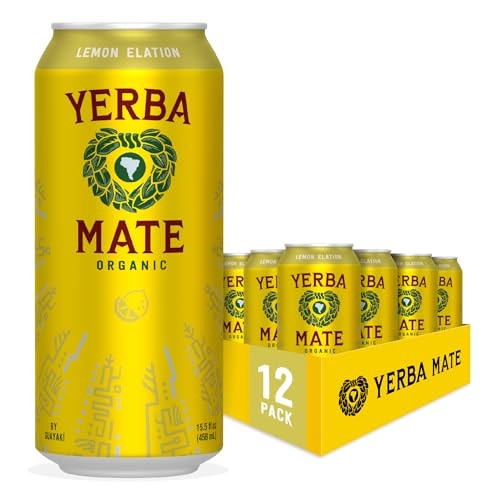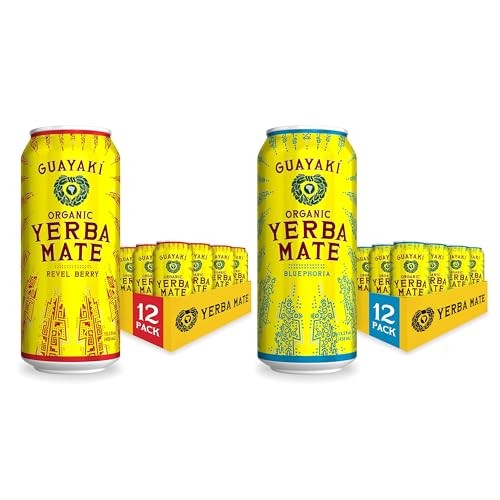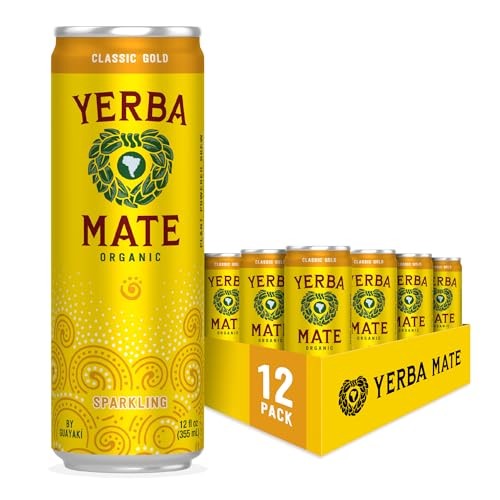How Much Caffeine Is In A Yerba Mate? Understanding caffeine content in Yerba Mate is essential for individuals seeking a natural energy boost without the jitters. HOW.EDU.VN provides expert insights and solutions for navigating the nuances of Yerba Mate and other caffeinated beverages. Explore the energizing effects, optimal consumption practices, and potential health benefits associated with this invigorating South American brew.
1. Understanding Yerba Mate and Its Caffeine Content
Yerba Mate, a traditional South American beverage, is renowned for its energizing properties and unique flavor profile. Made from the dried leaves of the Ilex paraguariensis plant, it has been consumed for centuries as a natural stimulant. But how much caffeine does this popular drink really contain?
1.1. What is Yerba Mate?
Yerba Mate is more than just a beverage; it’s a cultural icon in countries like Argentina, Uruguay, Paraguay, and Brazil. Traditionally, it is prepared in a gourd called a “mate” and sipped through a metal straw known as a “bombilla.” The drink is known for its ability to enhance focus, boost energy levels, and provide a sense of well-being.
1.2. Factors Affecting Caffeine Levels in Yerba Mate
Several factors influence the caffeine content in Yerba Mate:
- Preparation Method: The way Yerba Mate is brewed significantly impacts caffeine extraction. Traditional methods, involving a gourd and bombilla, allow for continuous infusion, potentially yielding higher caffeine levels.
- Leaf-to-Water Ratio: A higher concentration of Yerba Mate leaves to water results in a more potent brew with increased caffeine.
- Brewing Time: Longer brewing times extract more caffeine from the leaves, leading to a stronger beverage.
- Type of Yerba Mate: Different varieties and brands of Yerba Mate may have varying caffeine concentrations due to differences in leaf processing and plant genetics.
1.3. Comparing Yerba Mate Caffeine to Other Beverages
To put things in perspective, let’s compare the caffeine content of Yerba Mate to other popular caffeinated drinks:
| Beverage | Caffeine Content (per 8 oz serving) |
|---|---|
| Yerba Mate | 60-85 mg |
| Coffee | 95-200 mg |
| Black Tea | 40-70 mg |
| Green Tea | 30-50 mg |
| Energy Drinks | 70-200 mg |
| Guayaki Yerba Mate | 150 mg (per 15.5 fl oz can) |



2. How Much Caffeine is Typically Found in Yerba Mate?
The caffeine content in Yerba Mate can vary, but typically, an 8-ounce (237 ml) serving contains approximately 60-85 mg of caffeine. This amount can fluctuate based on the factors mentioned earlier.
2.1. Average Caffeine Content in Different Preparations
- Traditional Mate: Prepared in a gourd, it usually contains between 60-85 mg of caffeine per serving.
- Yerba Mate Tea Bags: Similar to tea, these typically contain around 40-60 mg of caffeine per bag.
- Bottled and Canned Yerba Mate: Caffeine levels can vary significantly by brand, ranging from 30 mg to 150 mg per serving.
2.2. Examining Specific Brands and Products
Several brands offer Yerba Mate products with varying caffeine levels:
- Guayakí Yerba Mate: Known for its canned and bottled versions, Guayakí typically contains around 150 mg of caffeine per 15.5 fl oz can.
- EcoTeas: Offers both loose-leaf and tea bag options with caffeine levels generally ranging from 60-80 mg per serving.
- Traditional Medicinals: Provides organic Yerba Mate tea bags, with each bag containing approximately 45 mg of caffeine.
2.3. Caffeine Variability: Why Does It Differ?
The variability in caffeine content is influenced by several factors:
- Harvesting Season: Leaves harvested at different times of the year may have varying caffeine concentrations.
- Processing Techniques: Drying, curing, and grinding methods can affect the final caffeine content.
- Plant Age: Older plants may produce leaves with different caffeine levels compared to younger ones.
3. The Effects of Caffeine in Yerba Mate
Yerba Mate provides a unique blend of energy and focus due to its caffeine content and other beneficial compounds. Understanding these effects can help you make informed decisions about incorporating it into your routine.
3.1. Benefits of Yerba Mate Caffeine
- Increased Energy Levels: Caffeine stimulates the central nervous system, reducing fatigue and increasing alertness.
- Enhanced Mental Focus: Yerba Mate can improve concentration, making it a popular choice for studying and working.
- Improved Physical Performance: Caffeine can enhance endurance and reduce perceived exertion during physical activities.
3.2. Potential Side Effects and How to Mitigate Them
While Yerba Mate offers numerous benefits, it’s essential to be aware of potential side effects:
- Anxiety and Jitters: High doses of caffeine can lead to anxiety, nervousness, and jitters.
- Mitigation: Consume Yerba Mate in moderation and avoid drinking it close to bedtime.
- Insomnia: Caffeine can interfere with sleep patterns.
- Mitigation: Limit consumption to the morning or early afternoon.
- Digestive Issues: Some individuals may experience digestive discomfort.
- Mitigation: Start with small amounts to assess tolerance and avoid drinking it on an empty stomach.
3.3. Who Should Be Cautious with Yerba Mate?
Certain individuals should exercise caution when consuming Yerba Mate:
- Pregnant and Breastfeeding Women: High caffeine intake can affect fetal development and be passed through breast milk.
- Individuals with Anxiety Disorders: Caffeine can exacerbate anxiety symptoms.
- People with Heart Conditions: Caffeine can increase heart rate and blood pressure.
- Those with Sleep Disorders: Caffeine can disrupt sleep patterns and worsen insomnia.
4. Comparing Yerba Mate to Other Caffeinated Beverages
When considering Yerba Mate as a source of caffeine, it’s helpful to compare it to other popular caffeinated drinks.
4.1. Caffeine Content Comparison: Coffee vs. Yerba Mate
Coffee is known for its high caffeine content, typically ranging from 95-200 mg per 8 oz serving. In contrast, Yerba Mate usually contains 60-85 mg per serving. The effects of caffeine from coffee can be more intense and may lead to a quicker crash, while Yerba Mate provides a more sustained and gentle energy boost.
4.2. Caffeine Content Comparison: Tea vs. Yerba Mate
Tea, particularly black and green tea, also contains caffeine, but generally less than Yerba Mate. Black tea typically has 40-70 mg of caffeine per serving, while green tea has 30-50 mg. Yerba Mate offers a middle ground, providing a moderate amount of caffeine with additional health benefits.
4.3. Caffeine Content Comparison: Energy Drinks vs. Yerba Mate
Energy drinks often contain very high levels of caffeine, ranging from 70-200 mg per serving. These drinks can provide a rapid and intense energy boost but may also lead to negative side effects such as jitters, anxiety, and a subsequent crash. Yerba Mate provides a more natural and balanced source of energy compared to energy drinks.
5. How to Choose the Right Yerba Mate Product for Your Needs
With a variety of Yerba Mate products available, it’s important to select the one that best suits your preferences and caffeine tolerance.
5.1. Factors to Consider When Selecting Yerba Mate
- Caffeine Level: Determine your desired caffeine intake and choose a product accordingly.
- Form: Decide whether you prefer traditional loose-leaf, tea bags, bottled, or canned options.
- Flavor: Yerba Mate comes in various flavors, so experiment to find one you enjoy.
- Organic vs. Non-Organic: Opt for organic products to minimize exposure to pesticides and chemicals.
5.2. Loose Leaf vs. Tea Bags vs. Canned/Bottled
- Loose Leaf: Offers the most traditional experience and allows for customization of strength and flavor.
- Tea Bags: Provide convenience and consistent caffeine levels, ideal for quick and easy preparation.
- Canned/Bottled: Ready-to-drink options are convenient for on-the-go consumption, but caffeine levels can vary significantly.
5.3. Reading Labels: What to Look For
When purchasing Yerba Mate products, pay attention to the following:
- Caffeine Content: Check the label for the amount of caffeine per serving.
- Ingredients: Look for natural and organic ingredients, avoiding artificial additives and sweeteners.
- Serving Size: Be aware of the serving size to accurately assess caffeine intake.
6. Maximizing the Benefits of Yerba Mate
To fully enjoy the benefits of Yerba Mate, it’s essential to consume it responsibly and incorporate it into a healthy lifestyle.
6.1. Best Times to Drink Yerba Mate
- Morning: Start your day with Yerba Mate for a sustained energy boost and enhanced focus.
- Pre-Workout: Drink Yerba Mate before physical activity to improve endurance and reduce fatigue.
- Afternoon: Combat the afternoon slump with a serving of Yerba Mate to stay productive and alert.
6.2. Recommended Daily Intake
The recommended daily caffeine intake for adults is up to 400 mg. It’s best to consume Yerba Mate in moderation, considering your individual caffeine tolerance and sensitivity. Start with one or two servings per day and adjust as needed.
6.3. Combining Yerba Mate with a Healthy Lifestyle
Yerba Mate can be a valuable addition to a healthy lifestyle. Combine it with:
- Balanced Diet: Consume a variety of nutrient-rich foods to support overall health and energy levels.
- Regular Exercise: Engage in regular physical activity to enhance energy, mood, and well-being.
- Adequate Sleep: Prioritize getting enough sleep to allow your body to recover and function optimally.
7. Addressing Common Concerns About Yerba Mate
Like any caffeinated beverage, Yerba Mate may raise certain concerns. Addressing these can help you make informed decisions about its consumption.
7.1. Is Yerba Mate Addictive?
Yerba Mate contains caffeine, which can be habit-forming. However, it is generally considered less addictive than coffee due to its lower caffeine content and the presence of other beneficial compounds that provide a more balanced energy boost.
7.2. Yerba Mate and Sleep: What You Need to Know
Caffeine can interfere with sleep, so it’s best to avoid consuming Yerba Mate close to bedtime. If you are sensitive to caffeine, limit your intake to the morning or early afternoon.
7.3. Potential Interactions with Medications
Yerba Mate may interact with certain medications, such as stimulants and antidepressants. If you are taking any medications, consult with your healthcare provider before incorporating Yerba Mate into your routine.
8. Exploring the Cultural Significance of Yerba Mate
Yerba Mate is deeply rooted in South American culture and traditions. Understanding its cultural significance can enrich your appreciation for this unique beverage.
8.1. The History of Yerba Mate
Yerba Mate has been consumed for centuries by indigenous peoples in South America. The Guarani people revered the plant for its medicinal properties and used it in religious ceremonies. Jesuit missionaries later introduced Yerba Mate to Europe, where it gained popularity as a social beverage.
8.2. Traditional Preparation and Consumption
The traditional method of preparing Yerba Mate involves a gourd (mate), a metal straw (bombilla), and hot water. The drink is shared among friends and family, symbolizing hospitality and camaraderie.
8.3. Yerba Mate in Modern Culture
Today, Yerba Mate remains a popular beverage in South America and is gaining recognition worldwide for its health benefits and unique flavor. It is enjoyed in various forms, from traditional mate to bottled and canned versions.
9. Expert Opinions on Yerba Mate
To provide a well-rounded perspective on Yerba Mate, we’ve gathered insights from experts in nutrition and herbal medicine.
9.1. Quotes from Nutritionists
“Yerba Mate can be a healthy alternative to coffee, providing a sustained energy boost without the jitters. Its rich antioxidant content also offers additional health benefits.” – Dr. Emily Carter, Registered Dietitian
9.2. Insights from Herbal Medicine Practitioners
“In herbal medicine, Yerba Mate is valued for its ability to enhance mental focus and physical endurance. It’s a versatile herb that can support overall well-being when used responsibly.” – Maria Rodriguez, Herbalist
9.3. Scientific Studies on Yerba Mate
Numerous studies have explored the health benefits of Yerba Mate:
- A study published in the Journal of Agricultural and Food Chemistry found that Yerba Mate is rich in antioxidants, which can help protect against cellular damage.
- Research in the Journal of the American College of Nutrition showed that Yerba Mate can improve exercise performance and reduce fatigue.
- A study in the Journal of Ethnopharmacology highlighted Yerba Mate’s potential to support weight management and improve metabolic health.
10. Frequently Asked Questions (FAQ) About Yerba Mate
Here are some common questions about Yerba Mate to help you better understand this unique beverage:
10.1. What is Yerba Mate?
Yerba Mate is a traditional South American beverage made from the dried leaves of the Ilex paraguariensis plant. It’s known for its energizing properties and rich antioxidant content.
10.2. How much caffeine is in Yerba Mate?
An 8-ounce (237 ml) serving typically contains 60-85 mg of caffeine, but this can vary depending on the preparation method and brand.
10.3. Is Yerba Mate healthier than coffee?
Yerba Mate offers a more balanced energy boost and is rich in antioxidants, which may make it a healthier choice for some individuals.
10.4. Can Yerba Mate cause anxiety?
High doses of caffeine can lead to anxiety, so it’s best to consume Yerba Mate in moderation.
10.5. Is Yerba Mate safe for pregnant women?
Pregnant women should limit their caffeine intake, so it’s advisable to consult with a healthcare provider before consuming Yerba Mate.
10.6. Can Yerba Mate affect sleep?
Caffeine can interfere with sleep, so it’s best to avoid drinking Yerba Mate close to bedtime.
10.7. How is Yerba Mate traditionally prepared?
Traditionally, Yerba Mate is prepared in a gourd (mate) and sipped through a metal straw (bombilla).
10.8. What are the benefits of drinking Yerba Mate?
Benefits include increased energy levels, enhanced mental focus, improved physical performance, and rich antioxidant content.
10.9. Can Yerba Mate interact with medications?
Yes, Yerba Mate may interact with certain medications, so it’s important to consult with a healthcare provider if you are taking any medications.
10.10. Where can I buy Yerba Mate?
Yerba Mate is available at most health food stores, specialty tea shops, and online retailers like Amazon.
Navigating the world of caffeine can be complex, but understanding the caffeine content in Yerba Mate empowers you to make informed choices that align with your health and lifestyle goals.
Are you seeking personalized guidance on incorporating Yerba Mate into your wellness routine or have specific questions about its effects? At HOW.EDU.VN, our team of expert PhDs is ready to provide tailored advice and support. We understand the challenges of finding reliable health information and are committed to offering evidence-based solutions that meet your unique needs.
Don’t navigate your health journey alone. Contact us today to connect with a seasoned expert who can address your concerns and provide actionable strategies for optimizing your well-being. Reach out to HOW.EDU.VN at 456 Expertise Plaza, Consult City, CA 90210, United States, or give us a call on Whatsapp at +1 (310) 555-1212. For more information, visit our website at how.edu.vn and discover how our team of over 100 renowned PhDs can help you achieve your health and wellness goals.

